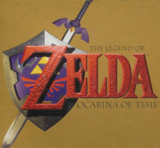After more than a decade OoT is still great fun, but newcomers will wonder what all the fuss is about.
Since then, Ocarina of Time has been re-released on numerous occasions. It appeared twice on special bonus discs on the Gamecube (one of which also included an enhanced version called Master Quest), and the Wii's Virtual Console is the latest platform on which this legendary game is revived. Twelve years later, however, even the game that many thought to be perfect, appears to not be invulnerable to time.
It goes without saying that the technical aspects of the game are vastly dated - the graphics of a Nintendo 64 game can't compare to what we saw in later generations, and the MIDI library used to play the (fantastic) compositions sounds even more outdated now than it did back then. This is all a bit useless, seeing as blaming a game for the technical limitations of the platform it appeared on is as useless as it is unfair.
There are some other issues, however. Because while the Z-Targeting was a fantastic innovation which made the fighting considerably more enjoyable, the battling itself feels empty and sterile. For swordfighting, the most prominent style of combat in OoT, there are only a couple of moves available, which often has you resort to standard protocols in beating sword-wielding enemies (and more often than not, these protocols involve a lot of simple button mashing). One can only imagine how much cooler the Dark Link fight would be if more moves would've been available, giving the fight a more technical edge. Instead, you have to resort to a few standard tricks with which you can quickly dispose of your mirror-image foe, as the technique of this game seemingly did not permit anything more complicated. The same basically goes for all swordfights with the tougher enemies in the game, be they Stalfos knights or Gerudo guards.
Another problem is the simplicity of many of the characters. Many of them will only blurt out a few insignificant lines and repeat them ad infinitum. This does not matter that much to Ocarina of Time's otherwise fantastic gameplay, but those who've played the game's direct sequel, Majora's Mask, which was released 2 years later on the same machine, will know that it was certainly possible to have characters with a bit more depth, be it in the form of a broader set of lines, or context-sensitive conversation. But the most annoying aspect of the conversation in Ocarina of Time is not so much its simplicity, but the fake choices that still are a persistent nuisance in video games today (Fable, anyone?). Once in a while, someone will ask you a question you can answer with 'yes' or 'no'. These questions are often very obvious (think along the lines of 'do you want to go out and save the world?'), and even when you give the obviously wrong answer, the question will simply be repeated until you select the right one. This trick to fool players into believing they have a choice to break away from the linear gaming process worked just as poorly back then as it does now, and it should've been left out altogether.
Don't get the impression that this game is any less enjoyable, however. Most of the complaints mentioned above would classify as slight annoyances rather than gamespoiling failures, and Ocarina of Time is still one of the most fun games you can download onto your Virtual Console. The dungeons are still very well designed, the puzzles are inventive, and the game is just very intelligent overall. Innovations such as the aforementioned Z-targeting and the context-sensitive A-button work as perfectly as they did back then, and nearly every aspect of Ocarina of Time's broad gameplay is still a delight to experience.
But perhaps the greatest aspect of this game, at least for yours truly, is the enchanting world you play in. OoT's rendition of Hyrule may be a small spot on the map compared to the gigantic worlds of more recent adventure and sandbox games, but seldomly has a gaming world been more exciting, more beautiful, and more mysterious than this one. While essentially the space is a bit limited by today's standards, it still feels grand: like a vast kingdom limited only by the imagination of the player. Even if you've seen every outcorner of the land of Hyrule (which is well possible considering it's been 12 years since we got to enter it for the first time), it still feels as unknown and mysterious as ever. How Nintendo managed to generate the feeling of the 2D Zeldas in three dimensions so well is equally mysterious.
And with that, it's obvious that Ocarina of Time is still worth experiencing after all these years, let alone for a measly €10. Old fans will find an equal amount of reward in beating the final boss as they did back then. New fans will also enjoy this title immensly, although it is severely doubtful they will be as overwhelmed as we were when it first came out. In subsequent Zelda games, Nintendo has fixed many of the flaws mentioned earlier in this review, and built upon the gameplay concepts OoT innovated to create adventures with even more grandeur and immersiveness. Twilight Princess in particular seemed to take everything Ocarina of Time did well, and multiplied it with 10. So younger or otherwise new players who were introduced to the Zelda universe by Twilight Princess might feel a bit underwhelmed when playing Ocarina of Time, and wonder what all the fuss is about.
It is undeniable, though, that Ocarina of Time, while not perfect, deserves its prominent spot in video gaming history, as it has been of tremendous service to the adventure genre and gaming in general, and altered the way we experience games. Apart from that, it's still just great fun.

